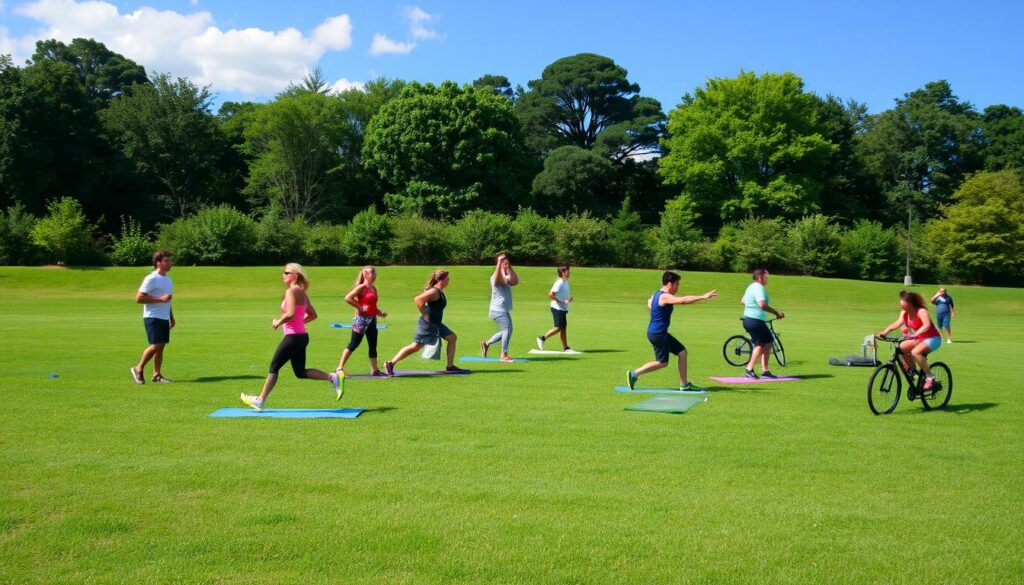Stress is a big part of our lives today, but we don’t have to let it control us. By using proven ways to manage stress, we can take back our mental and physical health. This article shares 10 effective techniques backed by science to help you handle stress better and live a happier life.
Key Takeaways
- Regular exercise for at least 2 hours and 30 minutes per week can significantly reduce stress levels.
- Practicing deep breathing exercises for 5 to 10 minutes a day can effectively lower stress.
- Incorporating a balanced diet rich in vegetables, fruits, whole grains, and lean protein can help manage moods and stress.
- Making small adjustments to daily routines, such as setting watches ahead, can contribute to stress relief.
- Dedicating 15 to 20 minutes a day for relaxation and hobbies can aid in stress management.
Understanding the Impact of Stress on Mental and Physical Health
Stress is a big part of our lives today. It can affect our minds and bodies in many ways. Knowing how stress works and its signs can help us manage it better.
The Science Behind Stress Response
When we feel threatened, our body’s stress system kicks in. It releases hormones like cortisol and adrenaline. These hormones give us energy and focus to handle tough situations. But, too much of these hormones can harm our health.
How Chronic Stress Affects Daily Life
Long-term stress can really impact our daily lives. It can cause physical problems like headaches and muscle tension. It can also make us feel tired and weaken our immune system, making us sick easier.
Emotionally, it can lead to mood swings, anxiety, and depression. It can also mess with our sleep and make it hard to focus.
Recognizing Stress Symptoms
Knowing the signs of stress is key to managing it. Common symptoms include:
- Changes in mood, such as increased anxiety or irritability
- Physical symptoms like headaches, muscle tension, and digestive issues
- Difficulty sleeping or concentrating
- Feeling overwhelmed or unable to cope with daily tasks
- Withdrawal from social activities or relationships
By spotting these signs, we can start to tackle the root causes. We can then use effective stress management strategies.

“Stress is not a state of mind… it’s measurable and dangerous, and it can kill you if it’s not addressed.” – Andrew Bernstein
Physical Exercise and Movement as Natural Stress Relievers
Many people face stress, but the bright side is that exercise can help. Studies prove that regular physical activity boosts both mental and physical health.
The Department of Health and Human Services suggests 150 minutes of moderate exercise weekly. Activities like brisk walking, swimming, or jogging can lift your mood and reduce stress.
A study revealed that 53 percent of adults find exercise or walking very or extremely effective for stress management. Also, 62 percent of adults skip exercise when stressed, showing its importance.
Exercise does more than just reduce stress. It boosts self-confidence, improves mood, and helps relax. Almost any exercise can increase fitness and lower stress.
Even short periods of activity can be beneficial. Interval training, with brief intense bursts, is safe, effective, and efficient.
Making exercise a daily habit is a natural stress fighter. By doing so, you improve your well-being and mental health.

“Regular exercise can increase self-confidence, improve mood, help relax, and lower symptoms of mild depression and anxiety.”
Essential Stress Management Techniques for Daily Life
Adding stress management techniques to your daily routine can greatly improve your well-being. Techniques like deep breathing and mindfulness are quick and easy to use. They help you deal with daily life’s challenges.
Deep Breathing Exercises
Deep breathing exercises can quickly reduce stress. They activate the parasympathetic nervous system, lowering stress levels. Take a few minutes each day to breathe slowly and deeply. This simple method can help you feel calm and in control.
Progressive Muscle Relaxation
Progressive muscle relaxation involves tensing and relaxing muscles. It helps release physical tension and promotes relaxation. By tightening and then releasing each muscle group, you can fight stress’s effects.
Mindfulness Practices
Mindfulness meditation helps you stay in the present moment. It reduces worries about the future. By being aware of your thoughts and feelings, you can manage stress better. Short mindfulness breaks can greatly reduce stress levels.
Remember, making relaxation exercises, meditation practices, and breathing exercises part of your daily routine is key. Start small and try different techniques to find what works for you.

Creating a Balanced Lifestyle Through Time Management
Effective time management is key to reducing stress and achieving a balanced life. By organizing your day, focusing on important tasks, and balancing work and personal life, you can live more fully and productively. This approach helps you enjoy life more and feel less stressed.
Begin by using calendars or apps to plan your day. Include time for work, study, and fun. Prioritize tasks based on their importance and value. This way, you focus on what matters most. Divide big projects into smaller steps to avoid feeling overwhelmed.
- Create routines that balance work and personal time, ensuring regular periods for relaxation and enjoyment.
- Avoid procrastination by setting realistic goals and deadlines, and stick to them.
- Combine errands and tasks to save time and increase efficiency.
- Work in intervals of 60 to 90 minutes with short breaks to maintain optimal productivity.
By using time management strategies, you can achieve a better work-life balance. This reduces stress and improves your mental and physical health. Remember, finding the right balance is a journey. With dedication and consistency, you can create a life that supports your health and happiness.
“Time management is not just about getting more things done; it’s about getting the right things done.” – Rory Vaden
The Role of Nutrition and Sleep in Stress Management
Managing stress and achieving a work-life balance are closely linked. Eating right and getting enough sleep are key. By choosing foods that help reduce stress and sleeping well, you can improve your mental and physical health.
Stress-Reducing Foods and Dietary Habits
Eating a diet full of whole foods can help lower stress. Include lots of vegetables, fruits, whole grains, lean proteins, and healthy fats in your meals. Stay away from too much caffeine, alcohol, and junk food, as they can make stress worse.
- Lean proteins like fish, eggs, tofu, and legumes can help make melatonin, the sleep hormone.
- Dairy, especially warm milk, has tryptophan, which helps you relax and sleep.
- Nuts and seeds with magnesium can ease muscle tension and lower stress.
Developing Healthy Sleep Routines
Getting enough quality sleep is key to managing stress. Adults should aim for 7-9 hours of sleep each night. Stick to a regular sleep schedule and have a calming bedtime routine for better sleep.
| Practices for Healthy Sleep | Benefits |
|---|---|
| Limiting screen time before bed | Promotes relaxation and melatonin production |
| Engaging in light physical activity | Reduces muscle tension and improves sleep quality |
| Practicing relaxation techniques | Calms the mind and body, facilitating better sleep |
Impact of Sleep Quality on Stress Levels
Good sleep is vital for your brain, emotions, and health. Stress can mess with your sleep, causing tiredness, lower productivity, and health problems. By focusing on sleep and healthy habits, you can handle stress better and avoid its bad effects.
“Proper nutrition and healthy sleep routines are essential for effectively managing stress and achieving work-life balance.”
Building Social Connections and Support Systems
Keeping strong social ties is key to managing stress well. Studies reveal that those with lots of social support handle stress better. They feel less stressed and their bodies react less to stress.
Feeling lonely or having little support can lead to depression and anxiety. Being isolated also raises the risk of heart disease, cancer, and high blood pressure. But, having supportive friends can help you live longer.
Talking to others releases hormones that make us feel calm and happy. Face-to-face chats are better than texting or calling. Spending time with loved ones makes us feel better than quick chats with strangers. It’s important to keep working on these relationships to manage stress over time. Bad friendships can actually make us feel more stressed and harm our mental health.















Leave a Reply